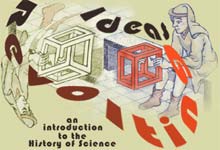
University of California, Irvine
Instructor: Dr. Barbara J. Becker

|
Quodlibet 7. Cities or clocks...? |
|
Curiously, the evolution of life itself is ruled by a strange marriage of cause and chance. The genetic alterations that make changes in species possible are random events--stray cosmic rays zapping atomic bonds. But biological imperatives ultimately determine the success of species. While chance plays a role, suitability to habitat plays a larger one.... Says Lee Smolin--physicist at Pennsylvania State University--the universe itself may have evolved by a kind of natural selection:
If blackholes give rise new baby universes, maybe universes with more black holes give rise to more baby universes than universes without black holes. Since black holes are created by massive stars, universes with lots of stars are more fit to survive than others. Partly by plan, partly by accident, our universe (and perhaps others) evolved to produce beings like us. Smolin says, the universe is more like a city than a clock. A clock needs a clockmaker to create it, and wind it up. But cities--like species--spring up of their own accord.
|
Charles Darwin (1809-1882) concluded his book, Origin of Species (1859), by calling it "one long argument." It was an apt way to describe this important contribution to what was, by then, an age-old dispute: is the world as we know it today a product of design or accident? chance or choice? It was simmering before William Paley (1743-1805) made his case for intelligent design in Natural Theology (1802), and even long before David Hume (1711-1776) was penning his critical Dialogues Concerning Natural Religion (1779) in the 1750s. The dispute continues at something of a slow boil today. |
Examine the excerpts from Hume's and Paley's essays. Use their comments, along with information drawn from Week 8's Readings, to support your own position on the question:
|
|